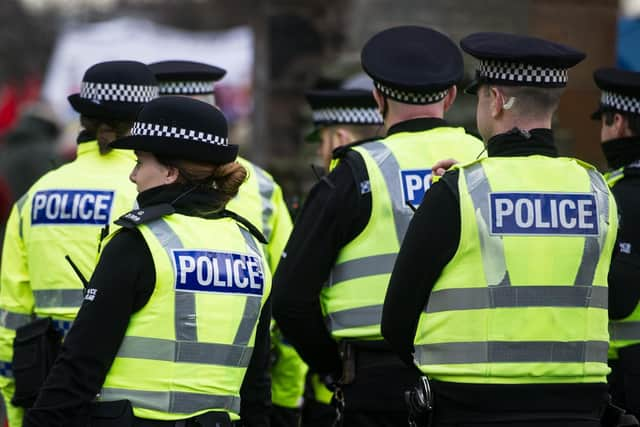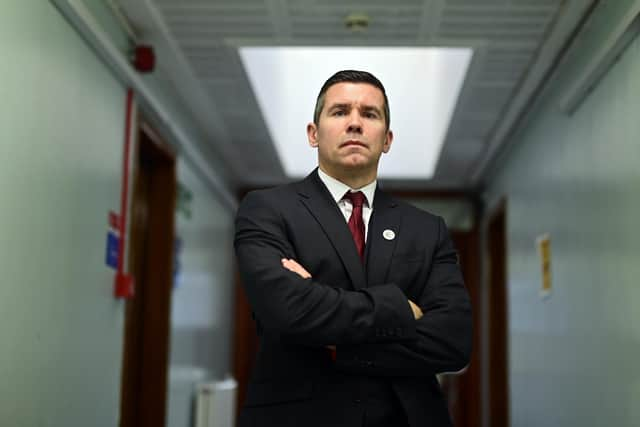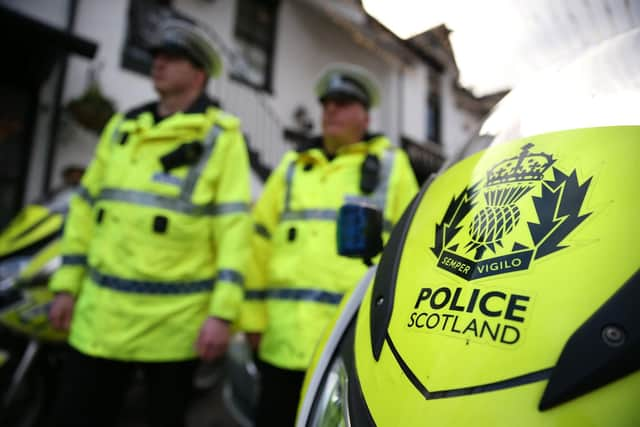Hate crime law goes live amid fears over police trust
A senior police chief has warned that Scotland’s new hate crime laws could damage trust and confidence in the force from both potential victims and perpetrators as the legislation comes into effect.
Police Scotland has begun enforcing the Scottish Government’s Hate Crime Act, three years after it was passed by MSPs.
Advertisement
Hide AdAdvertisement
Hide AdThe law will create new stirring up of hatred offences for protected characteristics including age, disability, religion, sexual orientation and transgender identity. These extra provisions will add to the long-standing stirring up racial hatred offences. Under the law, offences are considered "aggravated" if they are motivated by prejudice on the basis of set characteristics, which could influence sentencing by judges.


Chief Superintendent Rob Hay, from the Association of Scottish Police Superintendents (ASPS), has warned that those who report hate incidents that do not meet the criminal threshold could be left disappointed with the police response and those who are investigated but have not done anything wrong may feel “silenced” by officers.
The top officer has warned that a lack of public understanding about the new legislation could leave officers in the middle of dissatisfaction with the force about how it is being perceived to be enforcing the law. The ASPS has warned vexatious complaints could be made against people based on their views by political opponents and the law could be “weaponised” by an “activist fringe” across the political spectrum.
Mr Hay said the ASPS’s concern is that the new law could lead to a “huge uplift” in reports that “could damage trust and confidence in the police”.
He said: “What we’re going to be asking police to do is identify the tipping point between what is offensive and when offensive becomes abusive and therefore is subject to the legislation.”


Mr Hay added that “if you have hopes of the police intervening at a particular level but actually the criminal threshold isn’t met, then potentially you are going to be potentially disappointed and lose trust in the police”.
He said: “At the other side of that, if you know fine well that something you have said does not meet the criminal threshold and yet it’s reported to the police and the police come and investigate you, then you in turn might feel that you’ve been stifled, that you’ve been silenced when you’ve tried to engage in public debate on the side of the the issue.
“It’s a very difficult position to place police officers into.”
Advertisement
Hide AdAdvertisement
Hide AdA row has emerged over the reporting of non-crime hate incidents after Tory MSP Murdo Fraser was flagged for criticising Scottish Government transgender policy on social media.


Mr Hay warned that “we’ll still be recording details at that point”.
He added: “Actually, we might find ourselves in the position where a member of the public feels quite aggrieved for having their details recorded and kept for behaviour that doesn’t meet that criminal threshold.”
David Kennedy, general secretary of the Scottish Police Federation, said: “The public furore over the hate crime bill may damage Police Scotland’s reputation.”
But he warned that he “would hope that the general public realise that the individual police officers in Scotland will be trying their best to make good of a situation in a landscape that they have had no hand in”.
Scottish Conservative shadow justice secretary, Russell Findlay, said: “Humza Yousaf's hate crime law risks harming public confidence in policing as those who represent Scotland's most senior officers have already warned.
“It is frontline officers who will have to deal with unreasonable activists seeking to weaponise the legislation.
“There’s also the concern that law-abiding Scots targeted by spurious complaints will question the use of police time and resources.”
Advertisement
Hide AdAdvertisement
Hide AdMr Findlay added: “What happened to my MSP colleague Murdo Fraser is sinister and unacceptable and the concern is that other innocent people will end up in secret police files. No matter how these cases are dealt with by police and prosecutors, the law in itself will have a chilling effect on free speech.
“Officers would rather tackle real crimes and keep communities safe, rather than having to investigate malicious and spurious complaints. Humza Yousaf should bin his Hate Crime Act and instead divert resources towards frontline policing which is at breaking point.”
Scottish Labour justice spokesperson, Pauline McNeil, said: “After years of SNP cuts and the lowest level of officer numbers since 2008, Police Scotland is in dire need of support. Any failure to properly support Scotland’s police as they deal with the Hate Crime Bill will be unforgivable.”
But Scottish Green co-leader and Scottish Government minister, Patrick Harvie, stressed that police being required to make a judgement on what constitutes a criminal offence is “not new”.
He added: “There are people out there wildly misrepresenting what is in the hate crime legislation, what it will mean. For the most part, they’re trying to drag it into a kind of culture war space.
“Some of the people on the right in particular use phrases like free speech as though it only only means the freedom to be abusive and vile and unpleasant and prejudiced.”
Mr Harvie hit out at comments from the Conservatives, saying: “I’ve had direct threats of violence as a result of people reading that kind of inflammatory misinformation in the media.”
SNP Victims and Community Safety Minister, Siobhian Brown, said: “We know that the impact on those on the receiving end of physical, verbal or online attacks can be traumatic and life-changing. This legislation is an essential element of our wider approach to tackling that harm.
Advertisement
Hide AdAdvertisement
Hide Ad“Protections for freedom of expression are built into the legislation passed by parliament and these new offences have a higher threshold for criminality than the long-standing offence of stirring up racial hatred, which has been in place since 1986.”
